Federal Judge Dismisses Lawsuit That Sought To Strike Down Federal Marijuana Laws
A Federal Judge has dismissed a lawsuit that sought to invalidate Federal laws against marijuana use and possession.
A Federal District Court Judge in New York has dismissed a lawsuit seeking to challenge Federal laws banning use or possession of marijuana:
A federal judge in New York tossed out a sweeping lawsuit Monday that sought to make marijuana legal under federal law, ruling that the plaintiffs had failed to take the necessary first step of asking the Drug Enforcement Administration to remove cannabis from its list of dangerous substances.
The ruling by the judge, Alvin K. Hellerstein of Federal District Court in Manhattan, was a stinging defeat for the plaintiffs — among them a former professional football player who owns a company that sells pot-based pain relievers, a 12-year-old girl who treats her chronic epilepsy with medical marijuana and a nonprofit group that works on behalf of minorities in the marijuana industry.
Though several courts have ruled in the past against similar litigation, the suit dismissed on Monday was passing through the courts as the Trump administration reversed an Obama-era policy and, in January, encouraged federal prosecutors to go after marijuana sellers, even in states that have legalized the drug, imperiling the viability of the country’s multibillion-dollar pot industry.
The suit, filed in July, employed some novel legal arguments, including a claim that the country’s marijuana laws have traditionally discriminated against minorities and have long precluded people who use pot for their illnesses from boarding airplanes, which are regulated by the federal government.
In a 20-page opinion, Judge Hellerstein said that his decision did not address the plaintiff’s central argument that marijuana has medical benefits and thus should not be classified under the 1970 Controlled Substances Acts as a so-called Schedule 1 drug, the category reserved for the most pernicious substances. Judge Hellerstein noted, for example, that the 12-year-old girl, Alexis Bortell, used to have several epileptic seizures a day, but after treating herself with medical marijuana “she has gone nearly three years without a single seizure.
Rather, the judge said, under federal rules, the plaintiffs were bound to ask the D.E.A. to declassify marijuana as a Schedule 1 drug — and they did not. The D.E.A. rejected a similar request in a separate case in 2011 and again in 2016.
In his opinion, Judge Hellerstein quoted a colleague, Judge Elizabeth A. Wolford of Federal District Court in Rochester, who ruled two years ago that while marijuana has a clear medical purpose, Congress and the D.E.A. still have a right to regulate it.
The 98-page lawsuit presented its case for legalization not only through a host of constitutional arguments, but also by way of history — from marijuana’s first purported role 10,000 years ago in the production of Taiwanese pottery to the smoking habits of President Obama in his younger days. It pointed out that the ancient Egyptians used the drug to treat eye sores and hemorrhoids, and Thomas Jefferson puffed it for his migraines. James Madison credited “sweet hemp” for giving him “insight to create a new and democratic nation,” the suit noted.
Judge Hellerstein, however, seemed to be leaning toward rejecting the plaintiffs’ arguments when he held oral arguments earlier this month. In court, he appeared to agree with lawyers for the Justice Department, who maintained that if the plaintiffs wanted to legalize marijuana they should try to change the law.
As I noted earlier this month on the eve of the oral arguments, the case that the Plaintiffs were intriguing. The Complaint spanned some 89 pages consisting of more than 400 numbered paragraphs setting forth both the history of cannabis cultivation dating back tens of thousands of years, including during America’s Founding Era via practices and customs that stayed in place until the passage of the first Federal laws regulating the substance in the mid-1930s. As the Complaint spelled out cannabis has been used as a commercial product and for medical and recreational purposes for a very long time. Indeed, as the Complaint notes, prior to the 1930s it was used both for the manufacture of substances such as paper, clothing, and flags, for example. Additionally, several of the Founding Fathers not only grew cannabis as part of their farming but also apparently users. George Washington and Thomas Jefferson, for example, made a note in their diaries and other papers of having used marijuana, which at the time was referred to as “sweet hemp,” for medical and even recreation purposes. The Complaint also the detailed the history of the Federal Government’s legal battles against marijuana that began in the 1930s and were ramped up significantly when the so-called “War on Drugs” was announced under the Nixon Administration. One of the central arguments of the Complaint, in fact, centered around the fact that there was an allegedly discriminatory intent behind Federal and state marijuana policy in that it appears to have been due to its popularity among younger Americans and more particularly among African-Americans. Essentially, the Complaint argued that the crackdown against marijuana use and possession and the decision to classify it as a Schedule One drug along with heroin and cocaine was based on motives that had little to do with science or history and everything to do with social control. Because of that, the Complaint argued, Federal laws barring marijuana cultivation, sale, possession, and use were a violation of the Due Process Clause of the Fifth Amendment.
While the Complaint’s historical and scientific argument is interesting, and the policy arguments in favor of marijuana legalization are quite strong, the legal conclusions that the Plaintiffs were seeking to get the Court to make here were, to characterize them in the best light, unique and not very convincing. As a general rule, Courts are reluctant to step into an area such as this where the legislature and the President have acted, especially when the laws have been a long-standing as the ones at issue in this case. This is doubly true when it comes to issues such as the scheduling of marijuana as a Category One substance by the Drug Enforcement Administration. As with so many other issues, this clearly seems to be an issue that ought to be left to the democratic process to resolve rather than seeking to use the courts to achieve a goal that the Judiciary was not designed for. Of course, this may not be the end of the case. The Plaintiffs could appeal this case to the Second Circuit Court of Appeals and, eventually, the Supreme Court. In the end, though, it does seem that Judge Hellerstein’s ruling is likely to be upheld. Notwithstanding the fact that there are good policy arguments in favor of legalization does not mean that the laws themselves are unconstitutional. Instead of relying on the courts, legalization advocates will have to rely on the democratic process.
In that regard, things clearly seem to be in favor of the advocates of legalization. As German Lopez noted recently at Vox, January was the biggest month yet for the legalization movement thanks in no small part to the fact that the legalization initiative that had passed in 2016 went into full effect in California at the start of the new year. Additionally, Vermont became the first state to legalize marijuana via the state legislature rather than a referendum and New Jersey is likely to become the second state where that happens thanks to the election of Democratic Governor Phil Murphy, a supporter of legalization who has a Democratic state legislature that spent eight years trying to liberalize drug laws in the Garden State only to be thwarted by former Governor Chris Christie. Governor Murphy has already taken steps to use his regulatory powers to expand access to the state’s medical marijuana program. Additionally, the most recent polls show that nearly two-thirds of Americans, including a majority of self-identified Republicans, support legalization, a new high for that question. With the move in Vermont, there are now 30 states where marijuana is either fully legalized, decriminalized, or at least legalized for medical use. Finally, north of the border, Canadian Prime Minister Justin Trudeau is moving forward with his party’s promise during the 2015 election to legalize marijuana in Canada. Clearly, the democratic process is leading in a seemingly inevitable direction. It ought to be permitted to do so.
Here’s the opinion:
Washington Et Al v. Sessions Et Al Opinion by Doug Mataconis on Scribd
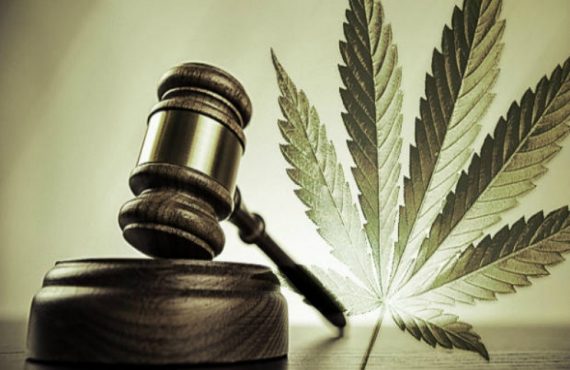

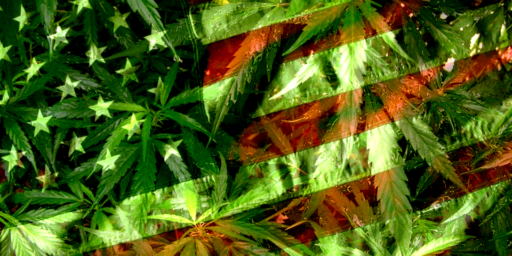
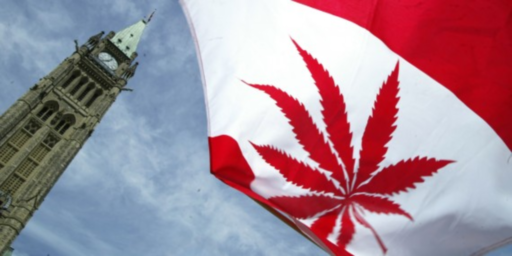
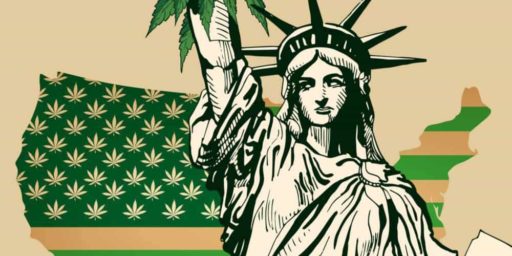
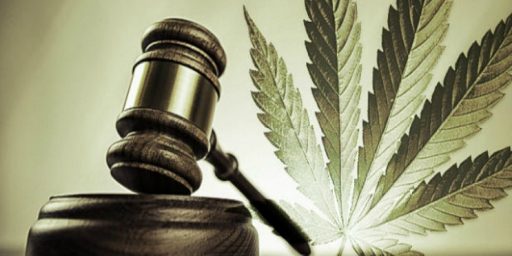
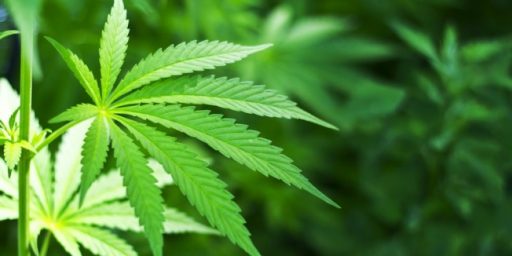
This is off-topic…but today Dictator-Donnie said:
Welcome to Trumpistan…the worlds newest Banana Republic.
I was a history major around 1970-71 when it became generally known that the Founders had used cannabis. Supposedly there was a grad student who had (as many of us had) learned a bit about the growing of ganja and realized that George Washington had sent a letter to Martha instructing the slaves at Mount Vernon to separate the male and female plants.
Up until then I think the general thought had been that the cultivation of hemp was for fibers only. But if you’re separating the male and female plants, you’re not only a smoker, you’re a pretty discriminating smoker.
Caused quite a sensation, as you can imagine.
@Daryl’s other brother Darryl:
I prefer to call it Dumbf***istan. It adequately recognizes those responsible for this sad state of affairs.
@Kathy:..Dumbf***istan…
How do you say that in Spanish?
@Mister Bluster: When someone says “good question,” you know their answer won’t be as good.
Good question.
Short version, Spanish doesn’t lend itself to combining words like that, and there’s no word or phrase that combines lack of intelligence with a sexual act. I’d have to think about it and come up with a good equivalent, that is not a slur on America in general.
Another arbitrary decision by an activist federal judge. Seems they are more interested in writing the laws than deciding on the Constitutionality.
Anyhow, I have been wondering if this marijuana would be an effective treatment for motion sickness. Any ideas? The theme parks open soon and I need to be ready.
I think the decision was unavoidable. We dealt with nullification some years ago. Federal law can’t just be wished away. And I note that I’m high as I write this.
@Tyrell:..Anyhow, I have been wondering if this marijuana would be an effective treatment for motion sickness. Any ideas? The theme parks open soon and I need to be ready.
Suzie Creamcheese and I used to do mescaline and go to the State Fair and ride the Bumper Cars!
@Mister Bluster: Well, the bumper cars are no problem for me. I am talking about 90mph coasters with corkscrews and loops that tend to rearrange the internal workings of the human body.
@Kathy: How about “Cibola de los chingaderos estúpidos?” To many words, I know.
@Mr. Prosser: And I had to look up Cibola.
Perhaps something like “Penjodilandia.” This combines “pendejo” menaing more or less “moron,” “jodido” meaning more or less “f***ed”, and the suffix “landia” meaning “land of” (in common use, and taken from hispanicized foreign words like Islandia).
@Kathy: Would the history of who “La Chingada” was lend the possibility of “Chingadarias” or some other similar variation working for this joke? My Spanish is not good (although my ex-wife teaches it) but I remember one of my teachers in graduate school telling me that the reason that a Spanish-English dictionary wouldn’t provide a definition for “chingada” was because the curse isn’t simply an f-bomb; there’s no English equivalent.
“there are now 30 states where marijuana is either fully legalized, decriminalized, or at least legalized for medical use” As far as medical MJ, if you count all forms that count is really 47 plus DC, Puerto Rica and some other territories. There are high CBD low THC states but they are all in conflict with the Federal Law (or at least the schedule 1 classification)
The US federal government policy on cannabis is a blatant bald-faced lie! According to the DEA drug schedule cannabis is more dangerous than methamphetamine or fentanyl! Data from the Center for Disease Control shows that cannabis is much safer than alcohol or tobacco products which are completely legal. Based on that fact alone cannabis should be completely legal as well!